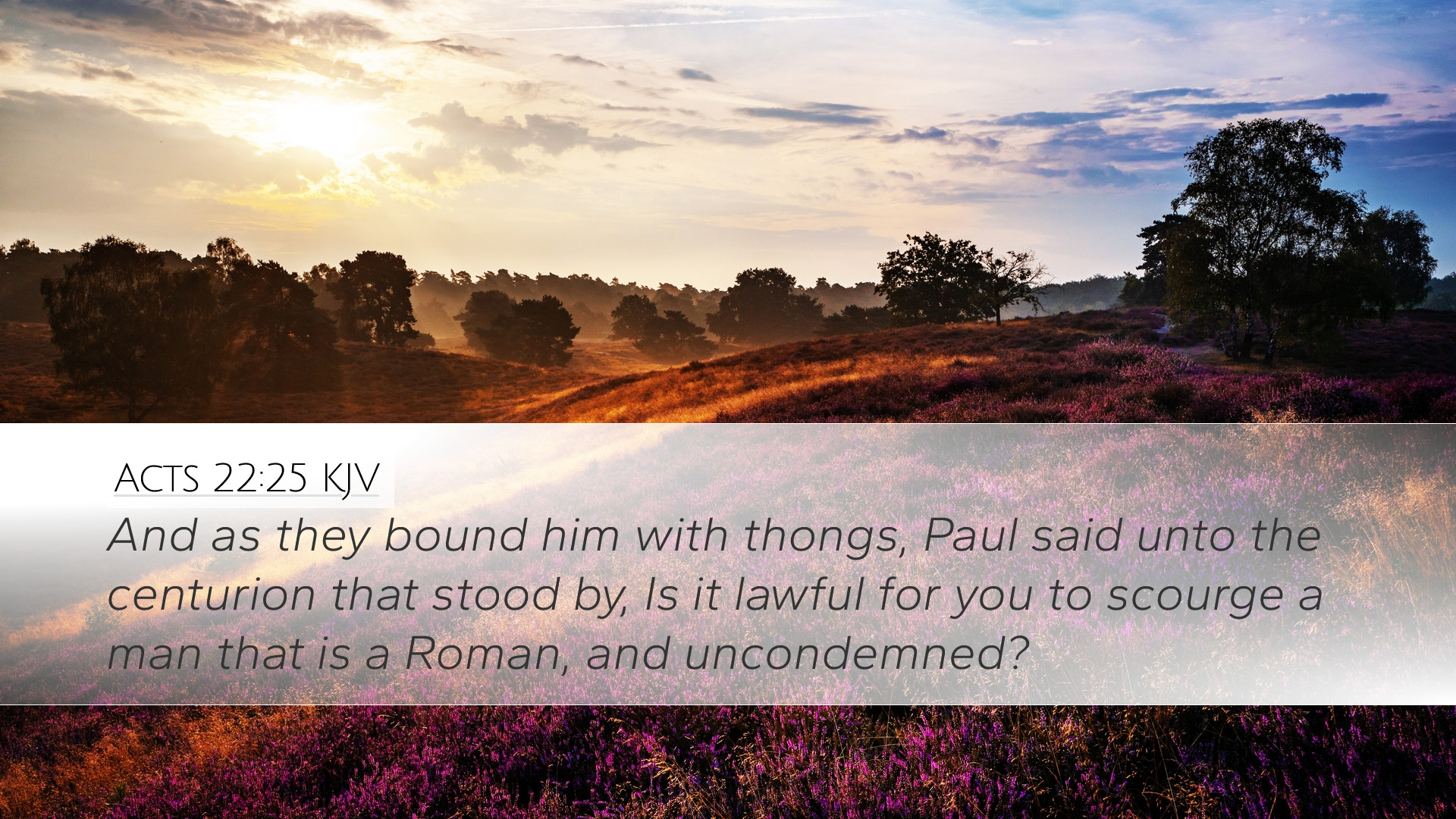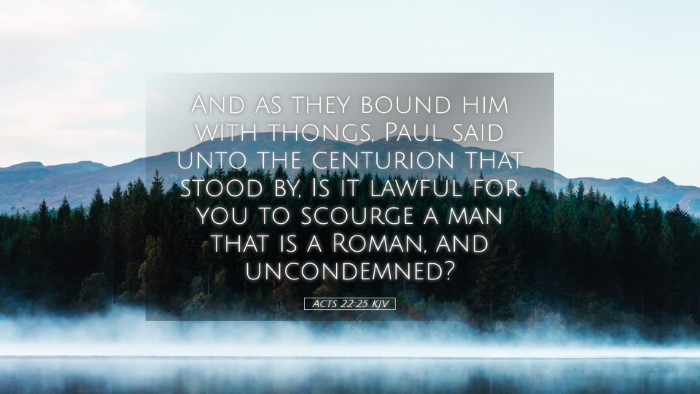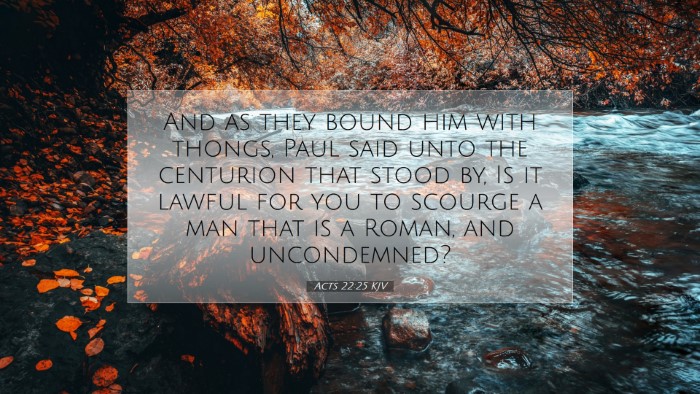Commentary on Acts 22:25
Verse Context: Acts 22:25 records a significant moment in the Apostle Paul's trial before the Jewish authorities. Paul, who had been seized and accused, invokes his Roman citizenship to challenge the legality of his treatment as a prisoner.
Text of the Verse
"And as they bound him with thongs, Paul said unto the centurion that stood by, Is it lawful for you to scourge a man that is a Roman, and uncondemned?" (Acts 22:25, KJV)
Commentary Overview
This verse emphasizes the legal rights afforded to Roman citizens and illustrates Paul's wisdom in utilizing his citizenship to challenge wrongful treatment. The passage speaks to the broader themes of justice, the exercise of authority, and the sovereignty of God in the affairs of men.
Insights from Commentaries
-
Matthew Henry's Commentary
Henry discusses how Paul, in a moment of duress, displayed remarkable courage and composure. He notes that the binding of Paul with thongs—straps used for punishment—depicted the imminent injustice he faced. Henry emphasizes that Paul’s question was not merely a defense of his own rights, but a declaration of the higher principles of justice that transcended Roman law.
Additionally, Henry asserts that Paul’s appeal to his citizenship was not selfish; it was a call for the acknowledgment of divine justice. By standing for his rights, Paul set an example for all believers to be vigilant regarding injustice and to seek fairness, even in dire circumstances.
-
Albert Barnes' Notes
Barnes provides a detailed examination of the legal implications of Roman citizenship. He points out that it was a grave offense to scourge a Roman citizen without a trial. In his discussion, Barnes highlights the fact that Paul, knowing the law, skillfully leveraged his status to avoid punishment and expose the impropriety of his captors.
Furthermore, Barnes contrasts the rights of the citizen with the condition of the accused under Jewish law, illustrating the clash between two legal systems. His insights reflect on the providence of God, who used Paul's heritage and rights to further the Gospel, even in chains.
-
Adam Clarke's Commentary
Clarke delves into the historical background regarding Roman citizenship. He explains that it was rare and highly valued, conferring protections that were not available to others, particularly in the case of punishment. Clarke emphasizes the importance of this incident in the broader narrative of Paul’s mission, suggesting that it served God's plan for the proclamation of the Gospel to the Gentiles.
Moreover, Clarke points out the mercy displayed by God in Paul’s situation. While Paul faced severe opposition and physical coercion, he was empowered by his Roman rights, demonstrating how God orchestrates circumstances for the good of His message and His people.
Theological Implications
The verse and its commentary raise several theological points for reflection:
-
The Nature of Authority:
Acts 22:25 reveals the dynamics between authority and justice. It serves as a reminder that while human authorities may wield power, they must adhere to justice and the law. This resonates with the Biblical theme of God’s sovereignty over earthly rulers.
-
The Role of Citizenship:
Paul’s assertion of his Roman citizenship highlights the privileges granted by earthly systems. It begs the question of how believers navigate their citizenship in earthly realms while holding a dual citizenship in the Kingdom of God.
-
Perseverance in Trials:
Paul’s reaction to his impending punishment demonstrates a model for believers. Despite facing adversity and potential persecution, he maintained his confidence in God’s plan, underlining the importance of spiritual resilience.
Application for Pastors and Theologians
This passage prompts deep reflection and application for those in ministry:
-
Encouragement for the Oppressed:
Pastors can draw parallels between Paul’s experience and the struggles faced by congregants today. Emphasizing God’s justice may provide comfort and provoke action against the oppression.
-
Teaching on Rights and Responsibility:
This verse can facilitate discussions on the balance between asserting rights in society and fulfilling Christian duties to love and submit to authority, promoting a holistic understanding of citizenship and discipleship.
-
Empowerment through Knowledge:
Educators and leaders must cultivate an awareness of Biblical truth and justice that empowers believers to advocate for themselves and others, replicating Paul’s wisdom and determination.
Conclusion
Acts 22:25 invites believers to explore the interaction between faith and justice, authority and rights. Through the reflections of prominent theologians, we find a deep well of insights where the legalities of Roman citizenship intersect with divine providence, contending against injustice while proclaiming the Gospel.


